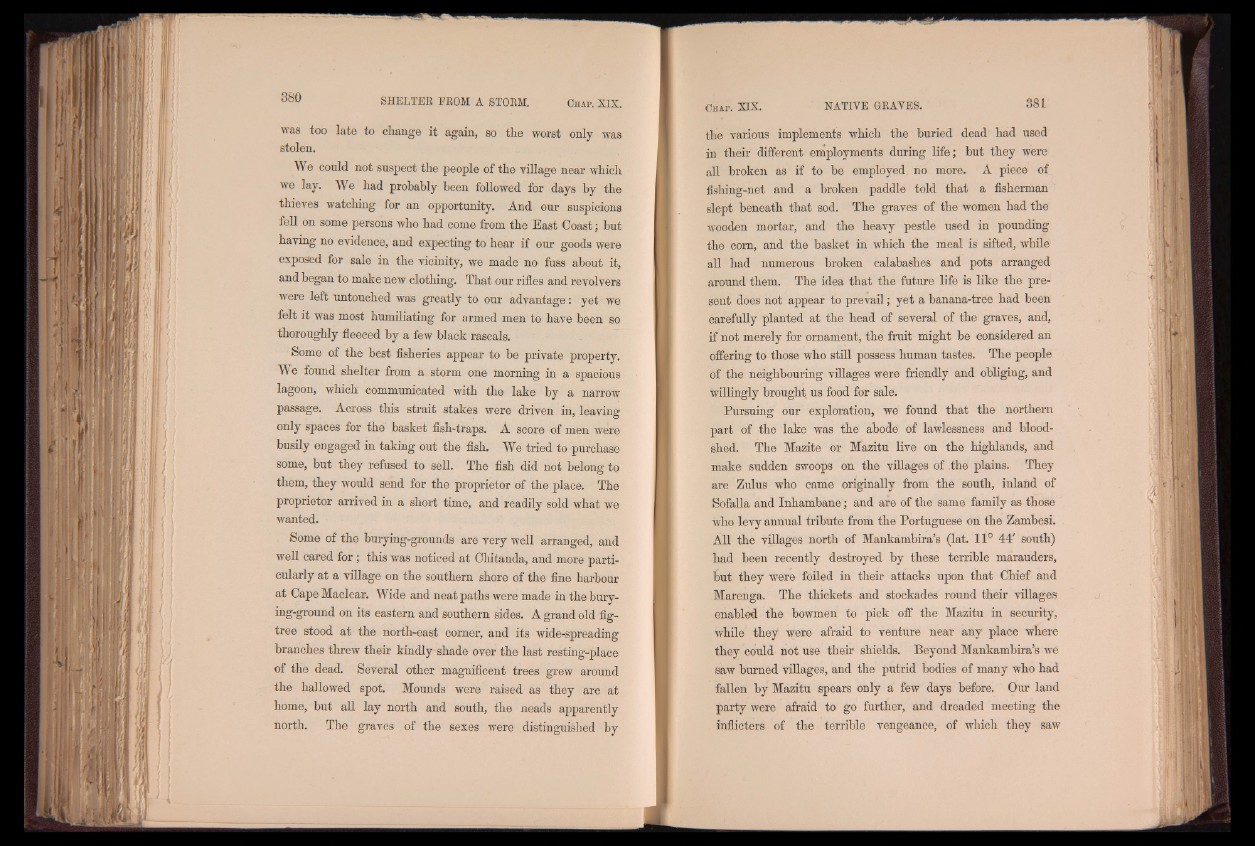
was too late to change it again, so the worst only was
stolen.
We could not suspect the people of the Tillage near which
we lay. We had probably been followed for days by the
thieves watching for an opportunity. And our suspicions
fell on some persons who had come from the East Coast; but
having no evidence, and expecting to hear if our goods were
exposed for sale in the vicinity, we made no fuss about it,
and began to make new clothing. That our rifles and revolvers
were left untouched was greatly to our advantage: yet'we
felt it was most humiliating for armed men to have been so
thoroughly fleeced by a few black rascals.
Some of the best fisheries appear to be private property.
We found shelter from a storm one morning in a spacious
lagoon, which communicated with the lake by a narrow
passage. Across this strait stakes were driven in,7 leavinOg
only spaces for the basket fish-traps. A score of men were
busily engaged in taking out the fish. We tried to purchase
some, but they refused to sell. The fish did not belong to
them, they would send for the proprietor of the place. The
proprietor arrived in a short time, and readily sold what we
wanted.
Some of the burying-grounds are very well arranged, and
well cared for; this was noticed at Chitanda, and more particularly
at a village on the southern shore of the fine harbour
at Cape Maclear. Wide and neat paths were made in the bury-
ing-ground on its eastern and southern sides. A grand old fig-
tree stood at the north-east comer, and its wide-spreading
branches threw their kindly-shade over the last resting-place
of the dead. Several other magnificent trees grew around
the hallowed spot. Mounds were raised as they are at
home, but all lay north and south, the neads apparently
north. The graves of the sexes were distinguished by
the various implements which the buried dead had used
in their different employments during life; but they were
all broken as if to be employed no more. A piece of
fishing-net and a broken paddle told that a fisherman
slept beneath that sod. The graves of the women had the
wooden mortar, and the heavy pestle used in pounding
the com, and the basket in which the meal is sifted, while
all had numerous broken calabashes and pots arranged
around them. The idea that the future life is like the present
does not appear to prevail; yet a banana-tree had been
carefully planted at the head of several of the graves, and,
if not merely for ornament, the fruit might be considered an
offering to those who still possess human tastes. The people
of the neighbouring villages were friendly and obliging, and
willingly brought, us food for sale.
Pursuing our exploration, we found that the northern
part of the lake was the abode of lawlessness and bloodshed.
The Mazite or Mazitu live on the highlands, and
make sudden swoops on the villages of the plains. They
are Zulus who came originally from the south, inland of
Sofalla and Inhambane; and are of the same family as those
who levy annual tribute from the Portuguese on the Zambesi.
All the villages north of Mankambira’s (lat. 11° 44' south)
had been recently destroyed by these terrible marauders,
but they were foiled in their attacks upon that Chief and
Marenga. The thickets and stockades round their villages
enabled the bowmen to pick' off the Mazitu in security,
while they were afraid to venture near any place where
they could not use their shields. Beyond Mankambira’s we
saw burned villages, and the putrid bodies of many who had
fallen by Mazitu spears only a few days before. Our land
party were afraid to go further, and dreaded meeting the
inflicters of the terrible vengeance, of which they saw